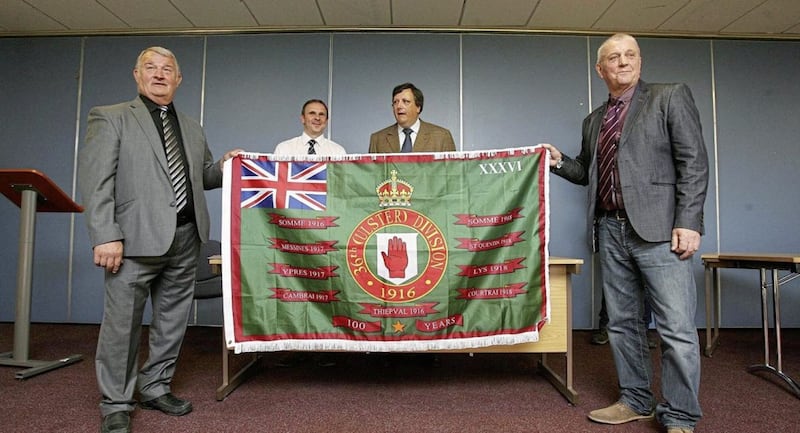A stark difference of opinion has been revealed by the latest LucidTalk poll.
Eighty-one per cent of unionists, including 91 per cent of DUP supporters, are in favour of DUP ministers meeting the Loyalist Communities Council (LCC), while 88 per cent of nationalists are opposed.
Just 6 per cent of nationalist respondents were in favour, with the remainder answering ‘don’t know'.
The gulf in opinion is unsurprising, as unionists and nationalists are completely talking past each other on this issue.
The dialogue of the deaf was perfectly illustrated at a Stormont education committee session in September, where nationalists complained about the LCC meetings.
DUP MLA David Brooks replied: “People talk about the Hume/Adams talks and the virtues in that and how it brought Sinn Féin in from the cold. I don’t necessarily share those views but it seems a particular attitude is taken whenever political unionism engages with representatives of loyalism. It’s double standards. In the community I represent, people are sick of that.”
Brooks was correct, although it could also be considered a double standard to cite Hume/Adams and then immediately say you might disagree with it.

Unionists fail to appreciate how sickened nationalists are by DUP lectures on the peace process.
Sinn Féin members of the committee responded to Brooks by referring to their party’s mandate. This has become the standard republican critique of loyalist engagement, as if it were self-evidently conclusive rather than adding insult to injury.
What unionists hear during the ‘mandate’ argument is ‘it’s fine to talk to terrorists if you elect them’, which they consider moral turpitude.
What unionists are thinking is ‘at least we don’t vote for terrorists’.
Republicans can seem enraged by this stance of moral superiority. Would they prefer the LCC to have 30 MLAs?
The only way to start cutting through this Gordian knot is to confront the moral ambiguities at the heart of the peace process.
They are less acknowledged now than three decades ago, when people had a more urgent understanding of their necessity.
There is far too much self-congratulation about how clever we were to stop killing each other and ever less reflection on how stupid and futile all the violence was from start to finish.
Grandiose analysis of the Troubles as a ‘dirty war’ is not matched by analysis of a dirty peace.
Many nationalists have said loyalists and the IRA can no longer be compared, so the correct parallel today with the LCC meetings would be Sinn Féin engaging with the political fronts for dissident republicans.
But Sinn Féin does try to do this and by the terms of the peace process it is right to do so.
When it emerged two years ago that Sinn Féin had approached Saoradh to develop a common strategy on a border poll, the party robustly defended “dialogue and engagement” as “a vital part of the peace process”.
The UUP is opposed to ministers meeting the LCC and criticised it at the Stormont committee. However, LucidTalk found that 60 per cent of the party’s voters support the meetings, with only 27 per cent against.

This indicates a degree of exasperation in the garden centre.
Throughout the Troubles, the touchstone of mainstream unionist opinion was that all terrorists, loyalist and republican, should face the full force of the law.
As the peace process commenced these unionists were informed - including by some of their own leaders - that their world-view was hopelessly simplistic, naivety verging on prejudice, in particular their faith in the security forces as defenders of law and order.
Nationalists have recanted none of this, yet now they want a law and order crackdown anyway.
Calls for this to apply equally to dissident republicans appear muted. Arrests and convictions of dissidents for serious offences still lead to ‘justice campaigns’ that can receive a sympathetic ear from the nationalist mainstream, including members of Irish government parties. Even use of the word ‘terrorist’ can be met with derision.

The unfashionable truth about the Troubles is that civic society endured by clinging to agreed moral certainties.
Nationalists were in the garden centre too: as late as 1998, the year of the Good Friday Agreement, 70 per cent of Catholic respondents to the Northern Ireland Life and Times Survey said they had “no sympathy at all” with the reasons republicans gave for violence.
Looking back to that consensus and celebrating it may be an essential next step towards a lawful society.
Ultimately, the LCC exists in the space where we have forgotten what normal means.




